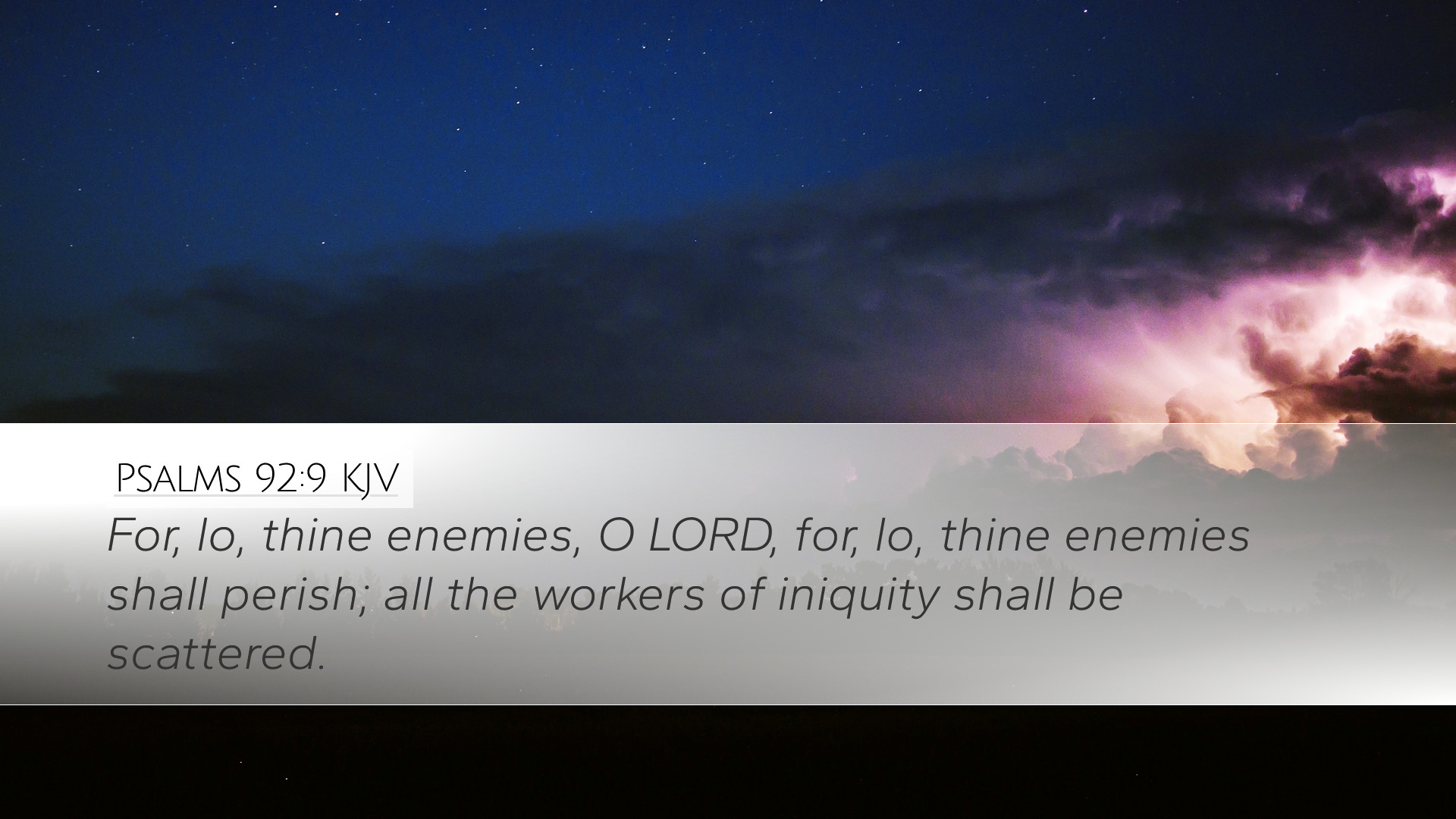Psalms 92:9 Commentary
Verse: "For, lo, thine enemies, O LORD, for, lo, thine enemies shall perish; all the workers of iniquity shall be scattered."
Introduction
This verse from Psalm 92 serves as a profound declaration of God's sovereignty over evil and His ultimate justice. It encapsulates a worldview where God stands as the protector of the righteous and as a judge of iniquity. The insights from esteemed commentators such as Matthew Henry, Albert Barnes, and Adam Clarke lend a rich theological depth to our understanding of this scripture.
Contextual Analysis
The Psalm is attributed to the Sabbath, a day set aside for rest and worship. It reflects gratitude towards God and His marvelous deeds. By recognizing the fate of the wicked, the Psalmist reinforces the hope and assurance found in trusting the Lord.
Matthew Henry's Insights
Matthew Henry emphasizes the following key points regarding Psalms 92:9:
- Recognition of Enemies: Henry notes that the Psalmist acknowledges the existence of enemies and evildoers. This recognition does not lead to despair; rather, it strengthens the faithful's resolve in God's promise of justice.
- Divine Justice: The phrase "shall perish" signifies more than mere physical demise; it embodies the idea of divine judgment and the ultimate fate awaiting those who oppose God's will. Henry argues that God's retribution is certain and serves as a source of hope for believers.
- Assurance to the Faithful: The mention of "the workers of iniquity shall be scattered" offers comfort. Henry suggests that while the congregation may face trials, God will ultimately defend and preserve them.
Albert Barnes' Commentary
Albert Barnes elaborates on several aspects of this verse:
- Imagery of Justice: Barnes interprets the perishing and scattering of enemies as a vivid portrayal of God's intervention in human affairs. He likens it to natural phenomena where oppressive forces are driven away by divine authority.
- Moral Assurance: He underscores that this verse is not just a prediction but serves as an assurance to the faithful. It reminds believers that their devotion does not go unnoticed and that God actively opposes the wicked.
- Hope and Consolation: For Barnes, this verse reassures the faithful that, through trials, they are not abandoned. The justice of God will eventually manifest, and evildoers will not stand in His presence.
Adam Clarke's Perspective
Adam Clarke provides additional insights that contribute to a multifaceted understanding of the verse:
- Theological Implications: Clarke suggests that the warning of perishing is a reminder of God’s long-suffering nature, where His patience allows for repentance before judgment is enacted.
- Historical Context: He discusses the historical backdrop of the psalm, positing that David likely wrote it during times of persecution. This context enhances the urgency of the testament that God will ultimately bring justice.
- Contrast of Outcomes: In Clarke’s view, the contrast between the faithful and the wicked reinforces God's governing moral order. The faithful are assured of protection and eventual vindication, while the wicked face inevitable consequence.
Theological Themes
From the insights of these esteemed commentators, we can distill several theological themes present in Psalms 92:9:
- Divine Sovereignty: The verse illustrates God's supreme authority over all creation, especially over those who act unjustly. It affirms that God holds the ultimate power to enact justice.
- The Reality of Opposition: The acknowledgment of enemies highlights the reality of spiritual and moral conflict. The Psalmist does not shy away from portraying the challenges faced by the faithful, emphasizing the ongoing battle against evil.
- Hope in Adversity: Amidst the distress caused by these enemies, the psalm reassures the faithful of impending divine intervention. This theme of hope is crucial for both personal and communal faith resilience.
Conclusion
Psalms 92:9 stands as a prophetic declaration of confidence in God's righteous governance. The affirmation that His enemies shall perish serves as both a warning and an encouragement for believers. The insights of Matthew Henry, Albert Barnes, and Adam Clarke collectively enrich our understanding of this text, urging us to hold fast to the promise of God’s justice in a world rife with opposition. In a contemporary context, this psalm challenges pastors, students, theologians, and Bible scholars alike to reflect on the nature of their faith in the face of adversity and the assurance of God’s ultimate triumph over evil.


